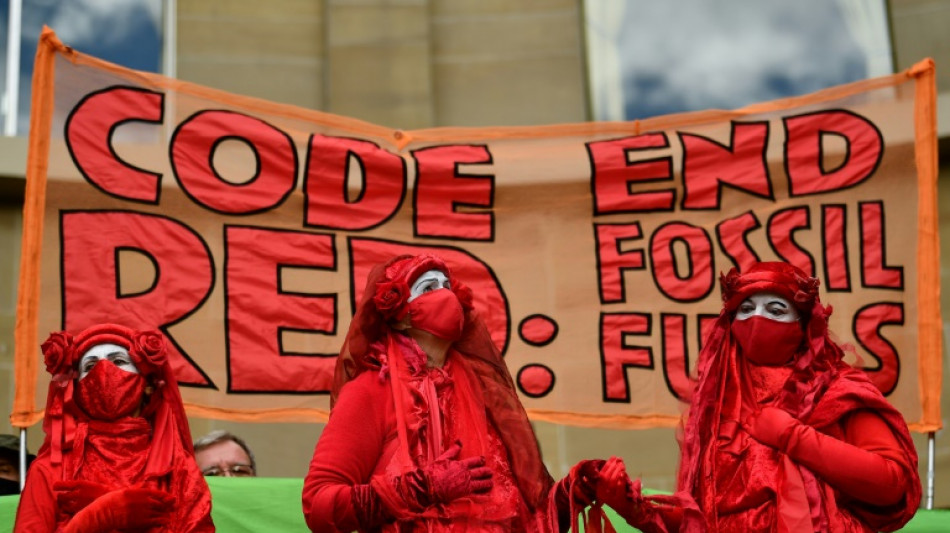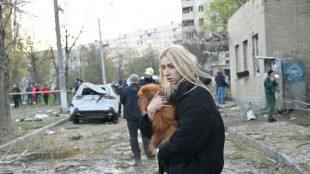
-
 SFWJ / Medcana Announces Strategic Expansion Into Australia With Acquisition of Cannabis Import and Distribution Licenses
SFWJ / Medcana Announces Strategic Expansion Into Australia With Acquisition of Cannabis Import and Distribution Licenses
-
Maresca confident he will survive Chelsea slump

-
 Mob beats to death man from persecuted Pakistan minority
Mob beats to death man from persecuted Pakistan minority
-
Lebanon says one killed in Israeli strike near Sidon

-
 Arsenal's Havertz could return for Champions League final
Arsenal's Havertz could return for Champions League final
-
US officials split on Ukraine truce prospects

-
 Client brain-dead after Paris cryotherapy session goes wrong
Client brain-dead after Paris cryotherapy session goes wrong
-
Flick demands answers from La Liga for 'joke' schedule

-
 'Maddest game' sums up Man Utd career for Maguire
'Maddest game' sums up Man Utd career for Maguire
-
Trial opens for students, journalists over Istanbul protests

-
 Gaza rescuers say Israeli strikes kill 24 after Hamas rejects truce proposal
Gaza rescuers say Israeli strikes kill 24 after Hamas rejects truce proposal
-
'Really stuck': Ukraine's EU accession drive stumbles

-
 'Not the time to discuss future', says Alonso amid Real Madrid links
'Not the time to discuss future', says Alonso amid Real Madrid links
-
74 killed in deadliest US attack on Yemen, Huthis say

-
 Southgate's ex-assistant Holland fired by Japan's Yokohama
Southgate's ex-assistant Holland fired by Japan's Yokohama
-
Vance meets Meloni in Rome before Easter at the Vatican

-
 Ryan Gosling to star in new 'Star Wars' film
Ryan Gosling to star in new 'Star Wars' film
-
Hamas calls for pressure to end Israel's aid block on Gaza

-
 Russia says Ukraine energy truce over, US mulls peace talks exit
Russia says Ukraine energy truce over, US mulls peace talks exit
-
58 killed in deadliest US strike on Yemen, Huthis say

-
 Museums rethink how the Holocaust should be shown
Museums rethink how the Holocaust should be shown
-
Three dead after deadly spring storm wreaks havoc in the Alps

-
 No need for big changes at Liverpool, says Slot
No need for big changes at Liverpool, says Slot
-
Bloody Philippine passion play sees final performance of veteran 'Jesus'

-
 New US envoy prays, delivers Trump 'peace' message at Western Wall
New US envoy prays, delivers Trump 'peace' message at Western Wall
-
Postecoglou sticking around 'a little longer' as Spurs show fight in Frankfurt

-
 US threatens to withdraw from Ukraine talks if no progress
US threatens to withdraw from Ukraine talks if no progress
-
Tears and defiance in Sumy as Russia batters Ukraine border city

-
 Russia rains missiles on Ukraine as US mulls ending truce efforts
Russia rains missiles on Ukraine as US mulls ending truce efforts
-
Tokyo leads gains in most Asian markets on trade deal hopes

-
 Two missing after deadly spring snowstorm wreaks havoc in the Alps
Two missing after deadly spring snowstorm wreaks havoc in the Alps
-
'War has taken everything': AFP reporter returns home to Khartoum

-
 US strikes on Yemen fuel port kill 38, Huthis say
US strikes on Yemen fuel port kill 38, Huthis say
-
Slegers targets Lyon scalp in pursuit of Arsenal European glory

-
 'Defend ourselves': Refugee girls in Kenya find strength in taekwondo
'Defend ourselves': Refugee girls in Kenya find strength in taekwondo
-
China's manufacturing backbone feels Trump trade war pinch

-
 Sri Lankans throng to Kandy for rare display of Buddhist relic
Sri Lankans throng to Kandy for rare display of Buddhist relic
-
Chinese vent anger at Trump's trade war with memes, mockery

-
 Heartbroken Brits abandon pets as living costs bite
Heartbroken Brits abandon pets as living costs bite
-
Mongolian LGBTQ youth fight for recognition through music, comedy

-
 Cash crunch leaves Syrians queueing for hours to collect salaries
Cash crunch leaves Syrians queueing for hours to collect salaries
-
Lyon left to regroup for Champions League bid after painful European exit

-
 Unravelling Real Madrid face Athletic Bilbao Liga test
Unravelling Real Madrid face Athletic Bilbao Liga test
-
Napoli disturbing buoyant Inter's peace in Serie A Easter bonanza

-
 Disappointed Dortmund chase consistency with Europe at stake
Disappointed Dortmund chase consistency with Europe at stake
-
Asian markets mixed as traders track tariff talks

-
 Yan and Buhai share lead at LA Championship
Yan and Buhai share lead at LA Championship
-
Under fire at debate, Canada PM Carney tries to focus on Trump

-
 Liverpool poised for Premier League coronation, Leicester, Ipswich for relegation
Liverpool poised for Premier League coronation, Leicester, Ipswich for relegation
-
India's elephant warning system tackles deadly conflict


UN science report to sound deafening alarm on climate
Nearly 200 nations kick off a virtual meeting Monday to finalise what promises to be a harrowing scientific overview of accelerating climate impacts that will highlight the urgent need to cut emissions -- and prepare for the challenges ahead.
The world is already feeling the effects of global warming, driven largely by the burning of fossil fuels, with last year seeing a cascade of deadly floods, heatwaves and wildfires across four continents.
The upcoming update from the Intergovernmental Panel on Climate Change (IPCC) is set to outline in stark detail what the best available science tells us are the impacts of the changing climate -- past, present and future.
During a two-week gathering, diplomats and scientists will vet, line-by-line, an all-important Summary for Policymakers, boiling down an underlying report thousands of pages long.
An early draft of the IPCC review seen by AFP in 2021 makes clear the extent to which devastating climate impacts are a here-and-now reality.
In some cases this means that adapting to intolerably hot days, flash flooding and storm surges has become a matter of life and death.
"Even if we find solutions for reducing carbon emissions, we will still need solutions to help us adapt," said Alexandre Magnan, a researcher at the Institute for Sustainable Development and International Relations in Paris and a co-author of the report, without commenting on the report's findings.
Species extinction, ecosystem collapse, crippling health impacts from disease and heat, water shortages -- all will accelerate in the coming decades even if the carbon emissions that drive global warming are drawn down, the report is likely to find.
"This is a real moment of reckoning," said Rachel Cleetus, Climate and energy policy director at the Union of Concerned Scientists.
"This not just more scientific projections about the future," she told AFP. "This is about extreme events and slow-onset disasters that people are experience right now."
- Planning ahead -
The report comes three months after pledges at the COP26 climate summit in Glasgow to halt deforestation, curb methane emissions, phase down coal-fired power and boost financial aid to developing countries.
IPCC assessments are divided into three sections, each with its own volunteer "working group" of hundreds of scientists.
In August 2021, the first instalment on physical science found that global heating is virtually certain to pass 1.5 degrees Celsius (2.7 degrees Fahrenheit), probably within a decade.
That is the heating limit envisioned in the Paris Agreement, beyond which impacts become more severe.
This second report on impacts and adaptation, due for release after the two-week meeting, is likely to underscore that vulnerability to extreme weather events -- even when they are made worse by global warming -- can be reduced by better planning.
This is not only true in the developing world, noted Imperial College professor Friederike Otto, pointing to massive flooding in Germany last year that killed scores and caused billions in damage.
"Even without global warming there would have been a huge rainfall event in a densely populated geography where the rivers flood very easily," said Otto, a pioneer in the science of quantifying the extent to which climate change makes extreme weather events more likely or intense.
- Hard choices -
The latest report will also likely zero in on how climate change is widening already yawning gaps in inequality, both between regions and within nations.
This means that the people least responsible for climate change are the ones suffering the most from its impacts.
Not only is this unjust, experts and advocates say, it is a barrier to tackling the problem.
"I do not think there are pathways to sustainable development that do not substantively address equity issues," said Clark University professor Edward Clark, a lead author of one of the reports chapters.
Earth's surface has warmed 1.1 degrees Celsius since the 19th century.
The 2015 Paris deal calls for capping global warming at "well below" 2C, and ideally the more ambitious limit of 1.5C.
This report is sure to reinforce that goal.
"There are limits -- for ecosystems and human systems -- to adaptation," said Cleetus. "We cannot adjust to runaway climate change."
Indeed, the report will probably emphasise more than ever before dangerous "tipping points", invisible temperature trip wires in the climate system for irreversible and potentially catastrophic change.
Some of them -- such as the melting of permafrost housing twice as much carbon as in the atmosphere -- could fuel global warming all on their own.
At the same time, scientists are only just beginning to get a handle on so-called cascading and compound impacts -- how Greenland's melting ice sheet, for example, affects ocean currents across the globe.
"There is a finite set of choices we can make that would move us productively into the future," said Carr. "Every day we wait and delay, some of those choices get harder or go away."
L.Durand--AMWN